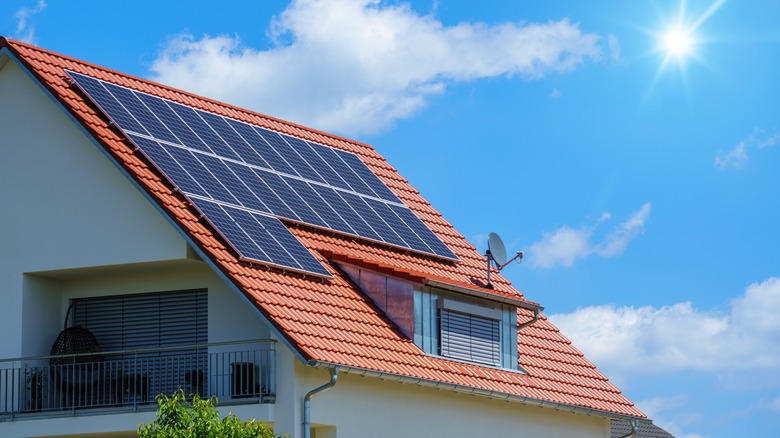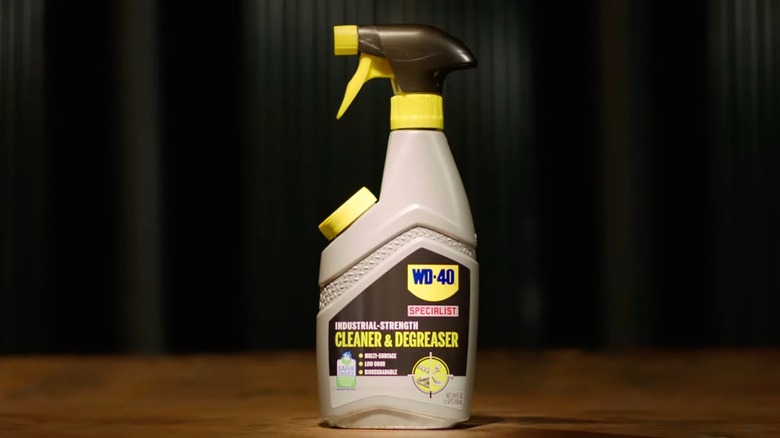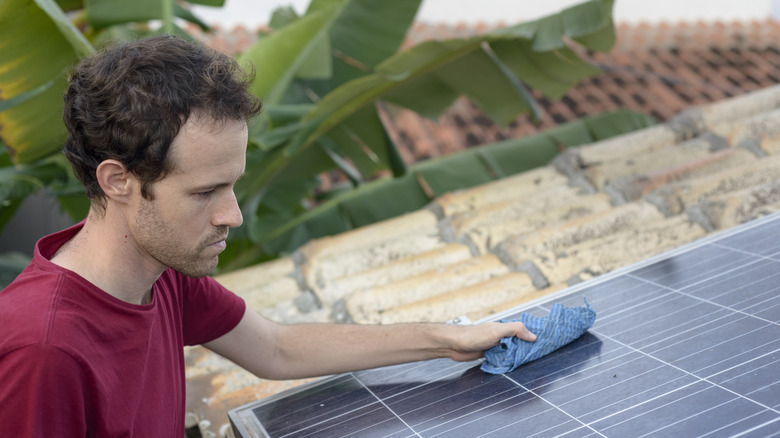Keep Your Solar Panels Clean And Efficient With This WD-40 Product
As concerns around climate change intensify, many homeowners and buyers seek out ways to reduce their carbon footprint and their energy bill. One exciting way to live more sustainably and save money is to install solar panels on your roof. At the same time, solar panels require a substantial investment and meticulous care in order to perform well. By using products like the WD-40 Specialist® Cleaner and Degreaser, homeowners can boost the lifespan and efficiency of their solar panels.
Most commercial solar panels only operate at about 17% to 20% efficiency (per EnergySage), and without proper maintenance, their efficiency falls even further. Homeowners can get the most out of their solar panels by properly cleaning and maintaining them. Cloudiness, dirt, and debris all create a shade effect that reflects sunlight and therefore reduces efficiency, which means that cleaning them thoroughly and regularly can help you get the most out of your investment. In fact, a 2018 study published by Solar Energy found that regularly cleaning dust from solar panels increased their power output by an average of 32.27%. While some aspects of the solar panel cleaning and inspection process are best left to professionals, homeowners can perform some simple cleaning and maintenance tasks themselves, including regularly wiping them down with this WD-40 product.
How to use WD-40 Specialist Cleaner and Degreaser to clean and protect solar panels
The cleaner your solar panels are, the better they can soak up that sunlight and convert it into energy for your household. One way to ensure that your solar panels really save you money is by using WD-40 Specialist® Cleaner and Degreaser to clean and protect them. From salt residue to dirt and grease buildup, this product can help you cut through the muck to restore your shiny solar panels. It also provides a protective barrier that keeps dust, dirt, and water from sticking to your panels and interfering with energy production.
To use the WD-40 Specialist® Cleaner and Degreaser on your solar panels, first choose a time of day when your panels are relatively cool — early morning is typically best. Turn off your solar panel system before you begin cleaning, and ensure you use a sturdy ladder. Remove larger debris like leaves, then gently scrub the solar panels with water and a long-handled, soft brush. Next, spray the solar panels with the WD-40 product and wipe them down with a clean cloth on an extender pole. Rinse the product off thoroughly. To finish, use a fresh, dry cloth to wipe down the panels one last time. This last step is essential to ensure that you don't leave any moisture or residue behind, which could interfere with the efficiency of your solar panels and cause more harm than good.
How often you should clean your solar panels
The frequency and type of maintenance your home's solar panels require depends largely on your location and climate, but a good rule of thumb is to clean them about twice per year. If you live in a rainy climate, your panels are already getting a great rinse with each rainfall, but a more thorough cleaning with WD-40 Specialist® Cleaner and Degreaser is still warranted every six months. If your solar panels are located near trees with falling leaves, in a salty environment like one that's near the beach, or in a climate that's particularly dusty or polluted, you may benefit from more frequent cleanings as well.
Using the WD-40 Specialist® Cleaner and Degreaser offers the added benefit of protecting your panels from dust buildup, corrosion, and rust, which can help you maintain great outputs between cleanings. While cleaning, be careful not to step on the solar panels or use any firm brushes that could scratch or chip your solar panels. In addition to cleaning your investment about twice a year with the WD-40 product, professional inspections are recommended annually in order to ensure that your system is working properly. These professionals can also address any small damages or corrosion that may appear on the panels and lead to further problems.


